Jon Cronshaw's Blog, page 24
June 13, 2024
What Fantasy Writers Can Learn From Mr. Bungle
In the realm of fantasy literature, where worlds are bound only by the limits of imagination, finding unique sources of inspiration is crucial.
For writers looking to inject a dose of the extraordinary into their narratives, the eclectic and often surreal music of Mr. Bungle offers a treasure trove of creative cues.
Known for their genre-defying soundscapes and theatrical flair, Mr. Bungle transcends conventional musical boundaries, providing a rich palette for fantasy writers seeking to spice up their creations.
The Art of Blending GenresMr. Bungle is infamous for their fearless fusion of genres—from metal and funk to jazz and circus music—creating a sound that is as unpredictable as it is compelling.
Fantasy writers can take a leaf out of Mr. Bungle’s book by mixing elements from various fantasy subgenres.
Imagine a world where high fantasy meets steampunk, or dark fantasy is infused with comic relief, much like how a Mr. Bungle track might weave heavy riffs with whimsical carnival tunes.
This approach not only sets a work apart but also enriches the narrative landscape, offering readers an experience as unexpected and refreshing as the band’s music.
Embracing the AbsurdMr. Bungle’s lyrics often delve into the absurd, drawing on bizarre and grotesque imagery that challenges the listener’s perception of reality.
Fantasy writers can draw inspiration from this willingness to explore the strange and the surreal.
By incorporating elements of the absurd into their worlds—be it through peculiar characters, surreal environments, or illogical rules that govern the world—authors can create a distinct narrative voice that captures the imagination in uniquely profound ways.
Creating Complex CharactersThe members of Mr. Bungle are known for their theatricality and ability to assume various personas, much like actors in a play.
This fluid identity is something fantasy writers can use to develop their characters.
Just as a Mr. Bungle song might shift perspectives and tones, characters in fantasy novels can be crafted with layers that reveal complexity and depth over time, surprising readers and adding a dynamic quality to the storytelling.
Utilizing Rich SymbolismMr. Bungle’s music is rife with symbolism, using sounds and lyrics to evoke emotions and ideas.
Fantasy writers can similarly enrich their narratives with symbols drawn from their worlds’ unique cultures and mythologies.
Whether it’s a cursed relic, a sacred animal, or a weather phenomenon peculiar to the fictional land, these symbols can deepen the thematic resonance of the story, much like how a haunting melody might underscore a pivotal moment in a song.
The Power of UnpredictabilityIf there’s one thing Mr. Bungle teaches us, it’s the power of unpredictability.
Their music never follows a predictable path, often veering off into unexpected directions.
In fantasy writing, maintaining an element of surprise can keep the readers engaged and on their toes.
Plot twists, unconventional world rules, or mysterious character motives—all these can make the narrative as thrilling and innovative as a Mr. Bungle album.
In the symphony of fantasy writing, drawing inspiration from a band like Mr. Bungle reminds us that the conventional can always be twisted into something spectacularly novel.
Just as the band blends disparate musical styles to create something entirely new, fantasy writers are challenged to meld diverse elements into their narratives, crafting worlds that resonate with originality and vibrancy.
So, tune into your favourite Mr. Bungle track, let the fusion of sounds transport you, and channel that creative energy into your writing.
Who knows what fantastic realms you might dream up with a little musical inspiration from one of the most avant-garde bands in the history of alternative music?
more writing tips.The post What Fantasy Writers Can Learn From Mr. Bungle first appeared on Jon Cronshaw.
June 12, 2024
Top 10 Post-Apocalyptic Books to Read in 2024: The Ultimate Reading List
In the often bleak landscape of our future imaginations, post-apocalyptic novels hold a mirror up to society’s darkest fears and, occasionally, our bizarre optimism.
As the world teeters precariously on the brink of myriad potential disasters—climate change, nuclear war, a pandemic or two—it’s almost comforting to dive into a book where everything has already gone spectacularly wrong.
So, if you’re looking to explore the end of the world from the safety of your sofa, here are the top ten essential post-apocalyptic novels that offer a tour de force through desolation, despair, and the odd, indefatigable cockroach of hope that seems to survive every catastrophe.
So, whether you’re a die-hard fan of the genre or just looking for a new type of story to read, these books are guaranteed to be a thrilling ride.
“The Road” by Cormac McCarthyIn this Pulitzer Prize-winning novel, follow a father and his son on a bleak road trip through a world scrubbed clean by an unnamed catastrophe.
McCarthy paints a world so grim that even the sun is on sabbatical.
As they navigate through the ashy wasteland, scrounging for canned goods, dodging cannibals, and sharing moments that are as tender as they are harrowing, it’s clear that their bond is the only fire that won’t go out in this cold, dark setup.
“The Children of Men” by P.D. JamesImagine a world where the baby section in supermarkets is as redundant as a comb in a bald man’s pocket.
P.D. James thrusts us into this unsettling reality where human fertility has fizzled out and the last generation born is now grown up, leading to global despair and a peculiar nostalgia for diaper adverts.
The story centres around a disillusioned bureaucrat who finds himself caught in a tumultuous movement to overturn a despotic government while grappling with the existential dread of humanity’s endgame.
“The Walking Dead” by Robert KirkmanIn Kirkman’s world, zombies are as common as bad Wi-Fi signals, and just as annoying.
This gripping graphic novel series tracks a band of survivors who learn the hard way that the only thing worse than a zombie with a bad attitude is pretty much any living human with power.
It’s a narrative feast of blood, guts, and the human condition, served up with a side of “who’s going to betray the group next?”
“The Road to Nowhere” by Meg ElisonAfter a plague has left the population thinner than a supermodel on a juice cleanse, a young woman finds herself traversing a barren America in “The Road to Nowhere.”
Armed with nothing but her wits and a pressing need to avoid becoming a disease statistic, she encounters enclaves of oddballs and outcasts who are redefining ‘strange new world.’
This journey isn’t just about survival but also about finding connection in the most disconnected of worlds.
“The Year of the Flood” by Margaret AtwoodIn Atwood’s not-so-green garden of Eden, gene-spliced animals roam free, and humanity is the endangered species.
“The Year of the Flood” weaves together the lives of two women surviving in a biotechnological apocalypse, complete with cults, corporate overlords, and carnivorous rabbits.
It’s part environmental manifesto and part survival thriller, with a sprig of dark humour to remind us that, in the face of the apocalypse, you either have to laugh or cry—and crying wastes water.
“The Last Man” by Mary ShelleyMary Shelley, not content with just birthing the science fiction genre with “Frankenstein,” decides to obliterate the human race with a plague in “The Last Man.”
Set in the late 21st century, this novel sweeps across a desolate world where our protagonist is left to pen history’s last diary entry.
As humanity coughs its way to oblivion, the narrative dives deep into solitude, despair, and the occasional existential crisis, offering a front-row seat to the end of the world show — spoiler alert, it’s not a sell-out crowd.
“The Postman” by David BrinImagine the post-apocalyptic world’s reliance on a hero, and you get… a postman.
David Brin’s “The Postman” revives the long-lost art of mail delivery in a future where the U.S. government has fewer members than a boy band.
Through the journey of a lone wanderer donning a postal uniform, the story delivers hope, stamped and sealed, to isolated communities.
In a world starved for communication, our postman hero proves that sometimes, all it takes to unite people is a bunch of old letters and an outdated job description.
“A Canticle for Leibowitz” by Walter M. Miller JrIn the aftermath of a nuclear apocalypse, where society has hit the ‘reset’ button all the way back to the Dark Ages, “A Canticle for Leibowitz” stitches together a narrative over centuries.
This tale marries monks with nuclear physics in a monastery dedicated to the preservation of scientific knowledge, led by the fictional patron saint of electricians, Saint Leibowitz.
Miller crafts a sardonic look at humanity’s penchant for self-destruction and history’s annoying habit of repeating itself, proving that no matter the era, people never really get tired of making the same mistakes.
“The Day of the Triffids” by John WyndhamJust when you thought it was safe to stop worrying about the robot uprising, John Wyndham brings you mobile, carnivorous plants.
In “The Day of the Triffids,” the world is blindsided quite literally — most of humanity loses their sight overnight, and to add insult to injury, they must now contend with sentient plants with a taste for human flesh.
This novel serves up a thrilling tale of survival, where the hierarchy of Earth’s species is questioned, and humans might not be at the top of the food chain anymore.
It’s a botanical nightmare that’ll make you reconsider keeping potted plants in your home.
“Swan Song” by Robert McCammonFollowing a nuclear war that turns America into a wasteland, “Swan Song” by Robert McCammon tells the epic saga of survivors who face not only the fallout but also the rise of supernatural forces.
As society crumbles, a young girl named Swan finds herself carrying the burden of possibly reviving hope for the world.
McCammon masterfully weaves a post-apocalyptic tapestry where the battle for good and evil gets murkier by the page, and every survivor’s tale is a heavy blend of horror, heroism, and a hint of magic.
In this grim new world, the quest for survival might just depend on a child who has the power to grow plants in a land where nature has been scorched away.

While our tour through the ashes of civilisations might not be the cheeriest journey you’ll undertake, these top ten post-apocalyptic novels provide profound insights into the human spirit.
They remind us that even at the end of the world, there can be beginnings.
So, whether you’re into the chilling echoes of silent cities, the thrill of dystopian survival, or just a glimpse into what might await after the apocalypse, there’s a book here to satisfy that morbid curiosity.
Keep the lights on, stock up on canned goods, and happy reading—just in case.
read Jon’s Wasteland series.The post Top 10 Post-Apocalyptic Books to Read in 2024: The Ultimate Reading List first appeared on Jon Cronshaw.
Out now! Guild of Assassins – a dark high fantasy novel
Soren, a gifted sculptor’s apprentice, dreams of a life beyond the walls of his hometown.
But when a mysterious assassin murders his father, Soren’s world shatters.
Driven by grief and a burning need for justice, he sets out to find the killer, aided by his loyal friend Alaric.
Their hunt takes a twisted turn when the assassin offers them a choice: join the shadowy guild responsible for his father’s death, or perish.
With no other option, Soren and Alaric are thrust into a brutal world of deadly politics, secret alliances, and a training regimen pushing them to their limits.
Under the harsh tutelage of the guild’s masters, Soren discovers a darkness within himself he never knew existed.
To survive, he’ll need to embrace the ways of the assassin and become a living weapon.
But as he’s forged into a killer, Soren faces a reckoning: can he complete his training without losing himself entirely?
get your copy.The post Out now! Guild of Assassins – a dark high fantasy novel first appeared on Jon Cronshaw.
June 11, 2024
“Guild of Assassins” Exclusive Excerpt
Soren buckled the leather apron straps around his waist, steeling himself as he marched into Master Kurgan’s studio. The familiar scent of clay and dust lingered in the air, the rhythmic tap of chisel on stone filling the workshop.
Kurgan’s stern eyes narrowed as he looked up from his work, his thin fingers poised above an emerging stone portrait. His bushy eyebrows furrowed. “You’re late.”
Soren swallowed hard. “I apologise, master. I lost track of time. It won’t happen again.”
Kurgan sniffed. “Perhaps you should lose track of those daydreams instead.”
“I really am sorry. I was—”
“I don’t need excuses.” Kurgan pointed at Soren’s cluttered workbench, gesturing towards the coating of dust. “I need you to focus on your work, boy.”
Soren dipped his head. “I know.”
“You’ll never master your craft if you’re always chasing shadows.”
Soren picked up his chisel and mallet, the tools at home in his grip, and continued working on his latest piece—an alabaster wyvern with its wings outstretched.
“Remember, Soren, the world beyond Nebel Hafen’s walls may seem alluring, but it’s as cold and unforgiving as the Braun Sea.”
Soren gritted his teeth and tried to ignore the thought nagging at him. There had to be more to life than this.
The day wore on and Soren soon regained focus on his work, the wyvern’s form slowly revealing itself with each strike of his chisel. It was the closest thing to magic in this world—the ability to create something beautiful and lasting from something as mundane as a block of lifeless stone.
The light from outside caught his attention. He blinked up at the window, his eyes dry and tired from dust and concentration. White-capped waves crashed against the harbour wall as the afternoon sun shone down on the Braun Sea.
Soren took this as his cue and broke away from his work. He cleaned his tools and swept the floor. He gazed at the half-finished wyvern on his workbench, its pink alabaster seeming almost translucent in the dim light. He couldn’t wait to get back to work on it, but errands for his master loomed.
Alaric appeared near the workshop door. He leant against the frame with one foot on the wall, a smirk on his face, and his hair still damp, no doubt from a morning spent at sea.
“Hey, Sor.”
Soren waved a hand in greeting.
“Need any help?”
“Thank you. That would be great.” Soren wiped Kurgan’s tools and gestured to his own workbench. “Help me finish up here. I need to run some errands for Master Kurgan.”
“Sure thing.” Alaric pushed off his leaning post.
Soren placed the last of Kurgan’s tools down and let out a sigh.
“What happened?”
“Nothing. I’m fine.”
“Let me guess.” Alaric grinned. “Old Kurgan wants you to clean his smallclothes.”
“Ha ha. Very funny.”
“It’s not that funny.”
“I know.” Soren cocked an eyebrow.
Alaric wandered over to the wyvern statue and pushed out his bottom lip. “This yours?”
“Yeah, he has me doing pointless little ornaments. Apprentice pieces, he calls them.”
“I guess we’ve all got to start somewhere. Your father had me mending nets again today. I want to be on the bow with a harpoon, bringing in a sperm whale. But, no, I get to sit in the hold, fiddling with old nets while my fingers turn red.”
“And I want to carve mountains.”
“Ah, the life of an artist.” Alaric ran his hands over the statue. “So mysterious and full of torment.”
“Torment? Hardly. It’s just…sometimes. I don’t know.”
“Oh, here we go.”
Soren glanced towards the window. “I feel like I’m stuck in this place, doing the same thing, day after day after day.”
“Welcome to being an apprentice.” Alaric clapped him on the back. “We all feel that way sometimes. At least when you’re finished, you don’t stink of fish guts, or have frostbite to contend with. You know, it was so cold out there today, I felt like my nose was going to freeze off. Imagine that. Your nose getting so cold it would drop off your face.”
“I guess.”
“I know you feel trapped in this place—we all do. But you have an incredible talent. And, one day, you’ll show everyone just how great you can be.”
“It can’t come soon enough.”
“Well, don’t let me get in the way of your fun.”
Alaric headed for the door.
“Yeah, right. Fun.”
Soren glanced around his still unfinished tasks and sighed as the door clicked shut behind Alaric. “Some help you were.”
A narrow stone path led to the cottage Soren shared with his father. He marched homewards, his head pounding, his arms aching, his legs spent. The thatched roof and whitewashed walls had weathered many storms, standing steadfast against the elements.
Warmth hit him as he opened the door and stepped across the threshold.
“Ah, there you are.” Soren’s father smiled across the kitchen as he bustled around, chopping vegetables with deft hands and stirring pots with practised ease. “I was ready to send out a search party.”
“Sorry about that.” Soren offered him a tired smile. “I had errands to run for the master.”
“Ah, well, needs must. I brought back some fine trout today. Not keen on these winds we’ve had coming from the north. Burn the skin off your knuckles if you’re not careful.”
“Alaric said it was cold.”
His father chuckled. “Aye. Very cold below deck out of the winds, I’m sure. He had it easy and he still found time to complain. Needs to buck his ideas up, that one.”
“I think he’s just itching to do more.”
“Oh? Has he been complaining?”
“No.” Soren shook his head. “I just remember him talking about how much he wanted to catch a whale, that’s all.”
“We’re a fisher, not a whaler.”
“I know.” Soren rolled up his sleeves and washed his hands at the basin. “Let me help.”
As they worked side by side, Soren couldn’t help but admire the precision and skill with which his father worked on the fish. With each cut, he removed the bones and excess skin, leaving behind perfect fillets. The sharp blade glinted against the warm light.
“You’ve got that look on your face again.” His father watched him with a sidelong glance. “Everything alright?”
Soren hesitated before answering. “I’m fine. I’m just looking forward to finishing my apprenticeship. I feel like…I don’t know. I can do so much more than ornaments. I’ve improved so much and I’m ready to do more…I know I am.”
“You’ve got a keen eye and a steady hand, son. But Master Kurgan has done you well.”
“I know. It’s just…”
“Just what?”
“I feel like there’s something more out there for me.”
“Like what?”
Soren shrugged. “I don’t know. I suppose it’s like Alaric—he’s stuck in the bowels of a ship all day, fixing nets when he’d rather be out hunting whales.”
“I see.”
“What I mean is, I don’t know if I can stay doing what I’m doing for another five years.”
His father paused, his eyes meeting Soren’s. “You’re free to follow your own path, son. But don’t forget where you come from. It might not be glamorous, but it’s honest work. In time, it’ll put food on your table.”
“I know.”
“I’ve paid a decent chunk of coin for that apprenticeship. I could have insisted you follow in my footsteps, but I wanted more for you.”
Soren forced a smile. “I know. And you’re right. I just…I just need to keep focused on getting better, focused on learning my craft.”
“That’s my boy.”
The next day, Soren’s arms were aching from hours of chiselling. He took a step back to admire the completed wyvern sculpture. A mixture of pride and satisfaction bloomed within him that he had transformed a lifeless slab of alabaster into a work of art.
He walked around the piece, studying it from all angles. Master Kurgan would have no choice but to let him move on to more challenging pieces.
A sudden draught drew his attention away from his work.
The door closed behind Alaric. “Nice job.” He sidled up to Soren and gazed down at the sculpture, rubbing his chin. “Is it supposed to look like a chicken?”
“It’s supposed to be a wyvern.” Soren wiped his brow with a dirty sleeve and registered Alaric’s smirk. “Oh, we’re doing this again, are we?”
“Seriously, though, it’s impressive.” Alaric leant in close, his voice dropping to a whisper. “I bet Kurgan did the finishing touches, though. No way you’d be able to do those scales like this without him holding your hand.”
Soren narrowed his eyes. “You can joke all you want, but it was all me.” He studied his work from several angles. “And I have outdone myself, if I’m being honest.”
“Because you’ve not been honest all this time?”
“You know what I mean.”
Alaric shook his head and grinned. “Nah. It’s good. You’ve done alright.” He gave Soren’s arm a playful punch.
“Careful!” Soren grabbed his chisel, catching it before it fell off the edge. “Tools of the trade.” He glanced towards the door. “But thanks, though. Kurgan’s been pushing me harder than ever. Sometimes I wonder if he will ever think I’m truly ready.”
“Maybe he wants you to reach your full potential, or something.” Alaric leant against a nearby table and picked up a hammer, turning it in his hand. “There’s always room for improvement, right?”
“Easy for you to say.”
“You’re right about that. Turns out I’m pretty good at this speaking lark.” He placed the hammer down and gestured to the door. “Come on. Let’s take a break. There’s more to life than chipping away at rocks.”
“What you got in mind?”
“I don’t know. Let’s have some fun. Cause some trouble, like we used to.”
“I’m not sure that’s a good idea.”
Alaric waved his hands. “Alright. No trouble. But all work and no play makes Soren a dull boy.”
“Fine. You win.”
“Excellent. Get some coin together. We could eat, have a few drinks, play some cards, whatever.”
Soren smiled. “Sounds good to me.”
“Let’s go then, before old Kurgan comes back and gets you to scrub his privy.”
The door opened, bringing with it the chill from outside.
“Oh, well.” Alaric took a step back. “Too late. Looks like you’ve missed the boat.”
Kurgan marched in with his arms folded and scowled at Alaric. “You again?” He gestured to the door. “Go on, do one. Be off with you.”
Soren gave his friend a helpless shrug. “I need to stay here.”
Alaric nodded and ducked past Kurgan. “Later, then?”
“Yeah. Later,” Soren said as Alaric departed.
Kurgan strode over to Soren’s workbench and gazed down at the wyvern. He stood silent for several seconds, his head turning this way and that as he tapped his chin. “You’ve done an adequate job there, boy.” He pointed to the tail. “Watch your tapering on the base. And the barb doesn’t look like that.” He lifted the wyvern and turned it in his hands. “You haven’t touched the underside of its feet. And wyverns have four claws, not three.”
Soren looked at his wyvern through Kurgan’s eyes and noted the flaws for the first time. “Thank you, master.”
“Also, you should add more depth to the scales. Remember, to capture reality, you have to exaggerate it slightly.”
“Thank you, master.”
“Remember, Soren”—Kurgan lay a hand on his shoulder—“true mastery comes not from talent but from humility and perseverance.” He raised a finger. “Talent gets you in the door. But it’s a commitment to learning one’s craft that marks a true artist.”
“Of course, master.” Soren hesitated for a moment, then spoke. “I was wondering…”
“What is it?”
“How many pieces like this did you have to do before you completed your apprenticeship?”
Kurgan shrugged and pursed his lips. “A few hundred at least, maybe a thousand or so.”
Soren gaped. “Are you…are you joking?”
“No joke.” Kurgan stroked his moustache. “And let’s just say, my old master wasn’t as lenient as I am.” He rolled up his sleeve, revealing faint scars across the backs of his hands and arms.
“What happened?”
“They’re reminders. They’re reminders of the importance of hard work, of commitment to your craft.” He jerked his sleeve back down. “But they also remind me that violence is ugly and terrible.”
Soren looked down at the back of his hands and chewed on the inside of his lip. “Thank you.”
“I received those beatings for much less than your mistakes.”
“I will try my best. I swear it in the eyes of Creation.”
“Good.” Kurgan cleared his throat. “Maybe if that fish boy wasn’t in here every day, you might produce some better work.” He placed the statue down and gestured to a block of white marble resting on a nearby bench. “I’d like you to try another piece. Work from the same brief, but this time in Sieshin marble. The stone is much harder to work, so keep your chisel sharp and your rhythm steady.”
“Another wyvern?”
Kurgan nodded. “Another wyvern. Is that going to be a problem?”
“No, master.”
“Have you considered experimenting with different materials?” He gestured to a collection of various stones and metals along the workshop wall. “It might help you grow as an artist.”
“I like working with alabaster. I really want to get good with it.”
“And leave everything else behind?” Kurgan shrugged as he began to pace. “Heed my words, boy. If you only master one thing, you will be an apprentice forever.”
Soren shook his head. “How am I supposed to become a great artist if I don’t have a specialism?”
“The specialism comes when you have mastered all parts of your craft. A solution in modelling may provide a fresh perspective on carving. Techniques and processes can be adapted from one medium to another. Don’t allow complacency to stifle your growth. If you’re not growing, you’re dying.”
“I understand.”
Kurgan patted Soren’s back. “You don’t.” He chuckled to himself. “But you will.”
The sun had dipped below the horizon by the time Soren locked up the workshop for the night. The dying light cast long shadows across the cobblestones, while a chilling breeze whispered through the air, carrying with it the scent of brine and the faint hints of fish and seaweed.
He double-checked the lock and started when Alaric slipped from the shadows.
“By Creation.” Soren’s hand shot to his chest. “You shouldn’t sneak up on people like that.”
Alaric rubbed his hands together, his face obscured by his hood. “So, what’s the plan?”
“Plan for what?”
“For tonight, fool.”
Soren shrugged a shoulder. “I’m tired, my arms ache, and I’m covered in dust. I just want to head home…It’s been a long day.”
Alaric grinned and placed both of his hands on Soren’s shoulders. “Great. We’ll head to yours. Get yourself changed and grab some coin, and then the night is ours.”
Soren let out a sigh and nodded. “Fine.” He headed back along the path through Meerand, Alaric at his side.
“I bet this place used to be so different back in the day.” Alaric gestured up to Meerand Castle. “Imagine living in that place when it was whole.”
“You’re not going to start with stories of the Guardians again, are you?”
Alaric shook his head. “I wonder what it was like, though, all those people. I bet there must have been hundreds of people living there.”
Soren gazed up at the ruins. “I guess everything comes to an end. I wonder what happened to them?”
“Maybe they’re still around, working in secret.”
“Yeah. And maybe the Wolfsbane clan are still hiding in the forests.”
Alaric sniffed. “I think we can definitely say that’s not happening.”
“Would you have joined?”
“What? The Guardians?”
“Yeah.”
“I don’t know. Maybe. Might be more fun than mending nets. Be a hero. Go on adventures. Bit of swashbuckling. Yeah, I could do that.”
“I bet it would be boring. I’d join up, do a seven-year apprenticeship, and then I’d probably end up in the offices, doing paperwork, knowing my luck.”
“You make your own luck in this world.”
“You sound like Master Kurgan.”
“Don’t say that. Never say that.”
“Are you going to start lecturing me on proper chisel care?”
Alaric laughed. “Yeah. And make sure you dust off those…tooly things.”
As they reached his cottage, Soren pushed open the door and entered the kitchen, still grinning, Alaric following on behind.
“Father?”
No answer.
Soren glanced around the dimly lit room. His gaze fell upon his father’s pipe smouldering on the table.
A muffled thump echoed from elsewhere in the cottage.
Soren turned to Alaric, his grin fading. “Stay here.” He bolted across the kitchen and headed for his father’s chamber. He threw open the door.
Soren froze. There, sprawled across the floor, was his father—his limbs contorted at unnatural angles, his throat cut.
Crimson blood pooled by his father’s side, and his eyes stared vacantly.
“This is…this is…”
Alaric joined Soren’s side and stared. “By Creation—”
“What kind of monster—?”
“Shh.” Alaric gestured behind him and ducked. “Someone’s here.”
Soren’s heart thundered in his chest. He willed his body to respond, and he crouched, hearing light footsteps move through the house.
But he couldn’t stay down long. He rose to stand. “We need to know who did this.”
Alaric jerked him back. “Are you completely mad?”
Soren shrugged off Alaric’s hold. “Better mad than a coward.”
“Fine.” Alaric’s jaw clenched. “But if we die, I’m blaming you.”
Soren crept through the cottage, every creak of the floorboards seeming to echo off the walls.
“Damn, he didn’t even let him finish his pipe.” Alaric shook his head. “That’s just rude.”
Soren glowered at Alaric.
By the faint light of the moon, he caught a glimpse of someone retreating outside. A man in grey, his face twisted by a gnarled scar across his right eye.
The man vanished into the night.
Soren wanted to give chase. But all he could do was stand in place, paralysed by it all. He stood at the cottage door and looked out into the darkness. “I swear in the eyes of Creation…”
Alaric stood beside him, his expression grim. “What do you want to do?”
“Find him.” Soren took his time scanning for any signs of the killer. “And catch him.”
“And then what?”
“And then we bring him to justice.”
Alaric nodded. “What about…” He gestured behind him.
“I can’t think about that right now.”
As they stepped outside, Soren took a deep breath. “We need information. Someone must have seen this bastard skulking around.”
continue reading.The post “Guild of Assassins” Exclusive Excerpt first appeared on Jon Cronshaw.
The Intertwined Themes of Revenge and Morality in “Guild of Assassins”
As a writer, one of my primary goals is to create stories that not only entertain but also challenge readers to consider deeper questions about the human experience.
In my upcoming dark fantasy novel, “Guild of Assassins,” I’ve woven a tapestry of themes that explore the complexities of vengeance, morality, and personal identity.
At its core, “Guild of Assassins” is a story about the consuming nature of revenge.
Soren’s Quest for JusticeWhen our protagonist, Soren, loses his father to a mysterious assassin, he’s driven by an all-consuming desire for justice.
But as he navigates the treacherous world of the assassins’ guild, Soren must confront the question of whether his quest for vengeance is truly justified, or if it’s merely a mask for his own anger and pain.
Morality in a Treacherous WorldThis ties into the larger theme of morality that permeates the novel.
In a world where killing is a profession and betrayal is a way of life, how does one maintain a sense of right and wrong?
Soren and his ally, Alaric, must grapple with the moral implications of their actions, questioning whether the ends justify the means when it comes to seeking justice.
The Search for IdentityBut “Guild of Assassins” is more than just a tale of revenge and moral ambiguity.
It’s also a deeply personal story about the search for identity in a world that seeks to define you.
Who is Soren?As Soren undergoes the brutal training of the assassins’ guild, he must confront the question of who he truly is.
Is he a sculptor, an assassin, or something else entirely?
Can he maintain his sense of self in a world that demands he become a ruthless killer?
Transformation and IdentityThis theme of identity is closely tied to the idea of transformation.
Throughout the novel, we see Soren and Alaric evolve as characters, both physically and emotionally.
They’re forced to adapt to their harsh new reality, shedding their innocence and becoming harder, more ruthless versions of themselves.
But at what cost?
Is it possible to maintain one’s humanity when surrounded by so much darkness?
The Power of ChoiceAnother key theme in “Guild of Assassins” is the power of choice.
Even in a world where fate seems to have a cruel grip, Soren and Alaric must ultimately decide for themselves what path they will follow.
Will they succumb to the darkness within, or will they find the strength to forge their own destiny?
A Tale of Human ComplexityUltimately, “Guild of Assassins” is a story about the human condition, in all its complexity and contradictions.
It’s a tale that asks readers to consider the depths of their own morality, the strength of their own convictions, and the malleability of their own identities.
A Writer’s Journey of DiscoveryAs a writer, exploring these themes has been a profound journey of self-discovery.
I’ve poured my own struggles and questions into these pages, and I hope that readers will find something of themselves in Soren and Alaric’s journey.
I invite you to delve into the dark, complex world of “Guild of Assassins” when it releases on June 12, 2024.
May it challenge you, move you, and leave you questioning long after you’ve turned the final page.
get your copy.The post The Intertwined Themes of Revenge and Morality in “Guild of Assassins” first appeared on Jon Cronshaw.
June 10, 2024
Exploring Key Tropes in “Guild of Assassins”
As a writer, I’ve always been intrigued by the pivotal role of tropes in storytelling.
When used effectively, tropes provide a familiar structure that resonates with readers, yet they also leave ample space for innovation and engaging narratives.
Introducing the “Orphaned Hero”At the core of “Guild of Assassins” is the “Orphaned Hero” trope.
Our protagonist, Soren, a humble sculptor’s apprentice, sees his life unravel when his father is mysteriously slain by an assassin.
This tragic event catapults Soren into a quest for revenge, challenging him to face the darker aspects of himself and the bleak realities of his environment.
The Role of Wise MentorsThroughout his journey, Soren encounters various mentors, each representing the “Wise Old Mentor” trope in a distinct manner.
From Kurgan, his sculpting teacher, to the seasoned instructors of the guild, these characters impart essential wisdom and hard lessons that are crucial for his survival and development.
The Dynamics of Unlikely AlliesJoining Soren on his quest is Alaric, a fisherman’s apprentice, showcasing the “Unlikely Allies” trope.
Coming from contrasting backgrounds, their alliance adds depth to their interactions as they navigate trust and dependency in a world where betrayal is common.
The Darker Side of Training MontagesTheir rigorous training within the assassins’ guild epitomizes the “Training Montage” trope, yet it’s imbued with a darker, more psychological intensity.
Both characters are pushed to their limits, confronting their ethics and humanity.
Secrets of the Assassins’ GuildThe guild itself is an exemplar of the “Secret Society” trope—a shadowy organization replete with its own intricate hierarchy and secretive agendas.
As Soren and Alaric delve deeper, they unravel ancient mysteries and confront the remnants of a once-heroic order, drawing upon the “Ancient Prophecies/Fallen Heroes” trope to enrich the narrative.
Confronting Loss of InnocenceOne of the most striking tropes in “Guild of Assassins” is “Loss of Innocence.”
As Soren and Alaric are compelled to confront the harsh realities of their world, they undergo significant personal transformations, highlighting the complex theme of the cost of vengeance.
Tropes, when thoughtfully implemented, can be powerful tools for crafting memorable, engaging stories.
In “Guild of Assassins,” I have aimed to blend traditional fantasy elements with a fresh, gripping approach to storytelling, ensuring a narrative that will captivate readers long after they turn the final page.
I am excited for you to join Soren and Alaric on this dark, thrilling adventure when “Guild of Assassins” is released on June 12, 2024.
get your copy.The post Exploring Key Tropes in “Guild of Assassins” first appeared on Jon Cronshaw.
The Legacy of “The Dragonbone Chair”: A New Era in Fantasy Storytelling
In the shadowy corridors of fantasy literature, where dragons lurk and heroes abound, Tad Williams‘s The Dragonbone Chair sits quietly, perhaps deceptively so.
Published in 1988, it has woven its influence through the genre with the stealth of a thief in the night.
This seminal work, the first of the “Memory, Sorrow, and Thorn” series, might not always shout its presence from the rooftops, but it has undeniably shifted the foundations of fantasy literature.
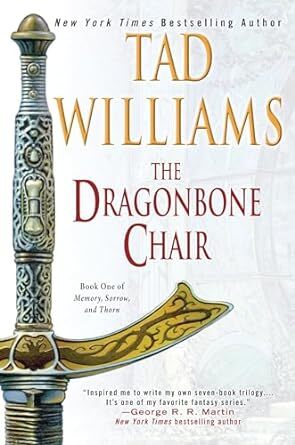 The Slow Burn of Epic Fantasy
The Slow Burn of Epic FantasyTad Williams took a gamble in The Dragonbone Chair, betting on readers’ patience with a slow-burning narrative that rewards those who stick around for the long haul.
His meticulous pacing and deep world-building lay the groundwork for a complex story that unfolds with the inevitability of a prophecy foretold, nudging other writers to take their time.
After all, why rush to slay the dragon when you can savour the journey?
Richly Painted Worlds and the Depth They DemandThe world of Osten Ard, with its rich tapestry of cultures, languages, and histories, is a testament to Williams’s dedication to the craft of world-building.
He crafts a universe so detailed that one might need a map, a compass, and a good memory to navigate it.
This comprehensive approach has encouraged a generation of fantasy authors to deepen their own worlds, proving that readers can indeed handle more than the superficial glitz of magic—they crave depth and detail.
Characters as Real as Your Eccentric UncleWilliams’s characters are a far cry from the cardboard heroes and two-dimensional villains often paraded in lesser tales.
Simon, the series’ young protagonist, stumbles and grows in ways that mirror the awkward journey through adolescence, resonating with authenticity.
This commitment to character complexity has pushed fantasy narratives towards more realistic, psychologically nuanced portrayals, where characters might be battling inner demons as fierce as any dragon.
The Ripple Effect on Modern FantasyThe legacy of The Dragonbone Chair is subtle yet pervasive.
Its influence can be seen in the works of later fantasy luminaries like George R. R. Martin, who has admitted to its impact on his own sprawling epics.
Williams’s blend of the epic and the intimate has paved the way for books where the fate of the world might hinge on personal betrayals and quiet moments of doubt, infusing the genre with a refreshing dose of human frailty.
The Quiet Giant of FantasyWhile The Dragonbone Chair may not always be the loudest voice in the room, its whispers have permeated the halls of fantasy literature, urging a richer narrative blend, deeper world-building, and more complex characterisation.
In the grand tapestry of the genre, Tad Williams stitches quietly but deeply, leaving a pattern that other writers follow, often without realising they are treading a path first laid by a master.
So, as we stand in the echoing halls of modern fantasy, it’s worth listening closely—you might just hear the faint creaking of a certain chair, bearing the weight of a genre forever changed.
follow jon on youtube.The post The Legacy of “The Dragonbone Chair”: A New Era in Fantasy Storytelling first appeared on Jon Cronshaw.
Exploring Vengeance and Justice in Assassin Fantasy Literature
In the shadow-strewn alleys of assassin fantasy, where daggers are as sharp as the wits of those who wield them, the tropes of vengeance and justice dance a perilous tango.
It’s a genre where every shadow could be a judge, and every whisper might be a sentence.
Here, we explore how these themes carve deep narratives into the very bones of assassin stories, with a smirk and a flourish.
Vengeance: A Dish Best Served with a Side of IronyVengeance is the bread and butter of the assassin’s diet, often setting them on a path that’s as bloody as it is cathartic.
It’s the primal scream in a darkened forest, the crack of a spine in a silent library.
The quest for personal revenge gives our cloaked protagonists a rather compelling reason to sharpen their blades, not to mention their life choices.
In assassin fantasy, vengeance is rarely straightforward.
It comes layered with the irony that those seeking retribution often end up adopting the very traits they despise in their adversaries.
They become mirrors of their enemies—albeit better dressed and with superior one-liners.
This trope challenges readers to question whether vengeance is merely justice without the paperwork, or a wild beast that gnaws at the roots of one’s morality.
Justice: The Light at the End of a Blood-Soaked TunnelThen there’s justice, a concept as elusive as a sympathetic tax collector.
In the realms of assassin fantasy, justice is often what the assassins are either fighting against or striving for.
It’s the carrot dangled before the thoroughbred racehorse of their moral compass, assuming it hasn’t been sold to buy more daggers.
Justice in these stories usually has more masks than a Venetian ball.
Whether it’s the rough justice meted out by our protagonists, or the higher moral ideals they aspire to achieve, it serves as a guiding light—a lighthouse for ships navigating the stormy seas of ethical ambiguity.
But as every good assassin knows, light makes it easier for your enemies to aim.
Why Do We Root for the Knife-Wielder?What makes these tropes endlessly fascinating is the reader’s own precarious moral balancing act.
We cheer for the assassin, the underdog with a questionable moral code, because they disturb the sediment at the bottom of the pond of justice.
They force us to confront uncomfortable truths about right, wrong, and everything in-between—preferably from a safe distance.
Plus, let’s be honest, there’s something inherently satisfying about seeing someone settle their scores with a well-placed blade rather than a sternly worded letter.
Let’s Cut to the ChaseAssassin fantasy novels provide a murky reflection of our own world’s struggles with vengeance and justice, wrapped up in a blood-soaked bow of thrilling narratives and dark deeds.
These themes resonate with us because they are as human as the desire for revenge on someone who spoils the ending of a book.
If your thirst for vengeance—or is it justice?—leads you down dark literary alleys, you might consider picking up Guild of Assassins.
Follow Soren as he navigates the treacherous waters of an assassin’s guild, where every choice is between being the blade or the sheath.
Will he find justice, or will his quest for vengeance change him beyond recognition?
Uncover the answers wrapped in thrilling action, dubious morals, and the ultimate quest for retribution.
After all, isn’t justice just vengeance with an official stamp?
order guild of assassins.The post Exploring Vengeance and Justice in Assassin Fantasy Literature first appeared on Jon Cronshaw.
Press Release: Jon Cronshaw’s Highly Anticipated Dark Fantasy Novel “Guild of Assassins” Launches June 12, 2024
FOR IMMEDIATE RELEASE
Jon Cronshaw’s Highly Anticipated Dark Fantasy Novel “Guild of Assassins” Launches June 12, 2024
Jon Cronshaw, the acclaimed British fantasy author, is thrilled to announce the release of his latest novel, “Guild of Assassins,” on June 12, 2024. Published by Wyvern Books, Ltd., this epic fantasy tale promises to captivate readers with its intricate world-building, complex characters, and a gripping story of vengeance and redemption.
“Guild of Assassins” follows the journey of Soren, a young sculptor’s apprentice whose life is shattered when his father is murdered by a mysterious assassin. Driven by a burning desire for justice, Soren sets out to uncover the truth behind his father’s death, only to find himself forced into the very guild responsible for the murder. As he navigates the cutthroat politics of the assassins’ guild and endures a brutal training regimen, Soren must confront the darkness within himself and decide how far he’s willing to go for vengeance.
“I’ve always been fascinated by the idea of a character being forced to become the very thing they hate in order to achieve their goals,” says Jon. “With ‘Guild of Assassins,’ I wanted to explore the psychological and emotional toll of that journey, while also creating an immersive fantasy world filled with danger, secrets, and complex moral dilemmas.”
Early reviews have praised “Guild of Assassins” for its gritty realism, pulse-pounding action, and deeply human story.
Jon Cronshaw is the author of the acclaimed Ravenglass Chronicles series. With a PhD in art history and a background in journalism, Jon brings a unique perspective and depth to his writing.
“Guild of Assassins” will be available in paperback, and e-book formats on major online retailers. For more information, visit joncronshaw.com.
About Jon Cronshaw:
Jon Cronshaw is a British fantasy and speculative fiction author.
. With a PhD in art history and a background in journalism, Jon now dedicates himself to writing fiction.
He lives in Morecambe with his wife, son, and guide dog, Digit.
Images:


The post Press Release: Jon Cronshaw’s Highly Anticipated Dark Fantasy Novel “Guild of Assassins” Launches June 12, 2024 first appeared on Jon Cronshaw.
June 9, 2024
A Beginner’s Guide to the Thrilling World of Assassin Fantasy
Welcome to the dimly lit world of assassin fantasy, a genre where the heroes are as sharp as the knives they hide and moral ambiguities are as common as cloaks and daggers.
For those new to the concept, assassin fantasy delves into the tales of those who operate from the shadows, executing justice or vengeance (and sometimes both) for the right price—or the right cause.
Here, we’ll slice through the main tropes and themes that define this intriguing subgenre.
What is Assassin Fantasy?Assassin fantasy is a subgenre of fantasy literature that revolves around the lives and lethal escapades of assassins.
Unlike traditional fantasy, where battles are fought in broad daylight with armies clashing over the fate of empires, assassin fantasy tends to focus on the individual, often delving into the darker, more personal conflicts that play out in the back alleys of bustling cities or the silent corridors of power.
Tropes and Themes of Asssassin FantasyThe Moral Ambiguity of Killing for a CauseOne of the most deliciously complex tropes in assassin fantasy is the ever-present question of morality.
Assassins in these stories often grapple with the ethics of their profession, blurring the lines between right and wrong until they’re as indistinct as footprints in a busy marketplace.
It’s a world where the end often justifies the means, and the means are usually fatal.
The Lone Wolf with a CodeMany assassin characters are crafted in the mould of the lone wolf—a solitary figure who operates outside the law but adheres to a personal code.
This code is as crucial to their identity as their stealthy footwear.
They might kill for money or revenge, but there are always lines they won’t cross… usually.
Complex Mentor-Apprentice RelationshipsIn a world where trust is as rare as a truthful politician, the relationships between mentors and their apprentices are fraught with tension and fraught with betrayal.
These relationships are a core element of training sequences, where deadly skills are passed down and life lessons are learned in the most hazardous ways imaginable.
Intrigue and Political MachinationsAssassin fantasy novels often unfold against a backdrop of intricate political plots.
Assassins are not just weapons but also key players in games of power, where thrones are the prizes and the players are seldom innocent.
The cloak and dagger aren’t just tools of the trade; they’re metaphors for the subterfuge that runs rampant in the corridors of power.
A Dance with DeathAt the heart of assassin fantasy is the ever-present dance with death.
Assassins flirt with their own mortality daily, and their survival depends as much on their skill with a blade as it does on their ability to navigate the perilous politics of their professions.
Their lives are a high-stakes game where a single slip could be fatal.
Why Dive Into Assassin Fantasy?For those intrigued by the darker side of human nature, assassin fantasy offers a compelling blend of adrenaline and intrigue.
It’s a place where every shadow could hold a secret and every character has an agenda.
If you’re ready to explore the depths of human resolve and the heights of treachery, assassin fantasy might just be your next favourite read.
So, sharpen your blades—or your wits, which are safer—and prepare to delve into tales where the most dangerous thing is not the assassin lurking in the shadows, but the truths they uncover.
Welcome to the dark, intricate world of assassin fantasy, where survival is an art, and the brush strokes are often painted in blood.
Essential Assassin Fantasy TitlesAs you embark on a shadowy journey through assassin fantasy, you’ll want to be well-armed with the best titles the genre has to offer.
Here’s a rundown of five essential books where the characters are as sharp as the blades they wield, and survival is the name of the game—if it were ever that simple.
The Way of Shadows by Brent Weeks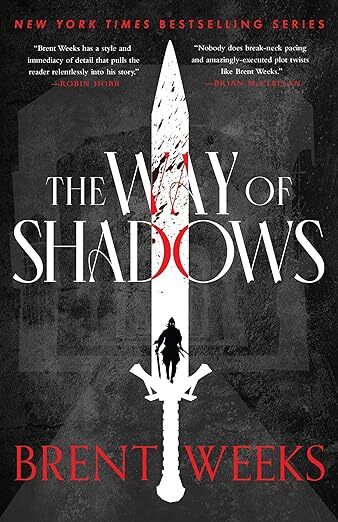
In The Way of Shadows, Brent Weeks takes us on a stroll through the city of Cenaria, a place where even the shadows seem to be plotting something nefarious.
This is the story of Azoth, a street urchin who apprentices himself to Durzo Blint, a master assassin whose curriculum vitae is as long as a life sentence.
This novel is an intensive masterclass in dark arts and darker ethics, perfect for those who like their morals as murky as a foggy night in Victorian London.
get your copy.Nevernight by Jay Kristoff
Jay Kristoff’s Nevernight is as subtle as a dagger to the ribs, and twice as sharp.
Here we meet Mia Corvere, who joins the deadliest flock of acolytes at the Red Church, a school where they teach you how to end lives just after morning chapel.
Mia’s quest for vengeance is fraught with literary booby traps and a shadowy companion that’s literally her own shadow.
Ideal for readers who enjoy their education sprinkled with a bit of murder.
get your copy.Vlad Taltos by Steven Brust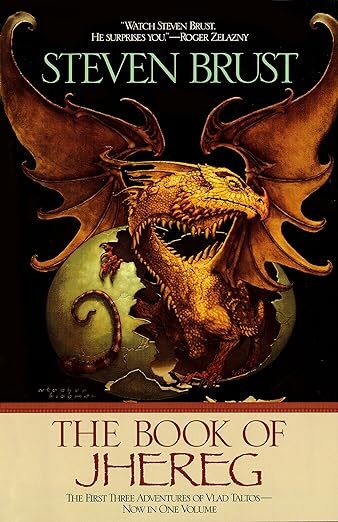
Vlad Taltos by Steven Brust offers a unique blend of high fantasy with a dash of organized crime—think The Godfather with swords and sorcery.
Vlad, a low-ranking thug-turned-assassin, navigates the cutthroat world of Dragaeran society, where social climbers are likely to use actual climbers to dispose of rivals.
This series is a guide on how to manage your career prospects in a world where your next promotion might just come at the sharp end of a dagger.
get your copy.Age of Assassins by RJ Barker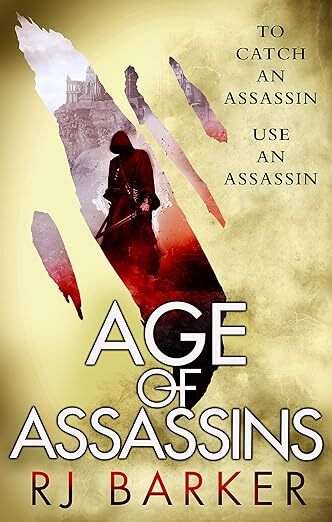
In RJ Barker‘s Age of Assassins, the line between being an assassin and being sent to early retirement is thinner than the pages of the book.
Girton Club-Foot, apprentice to the land’s best assassin, finds himself embroiled in a plot thicker than a winter stew.
This book is a riveting exploration of disability and destiny, proving that the deadliest weapon isn’t a blade, but a sharp mind.
get your copy.The Blade Itself by Joe Abercrombie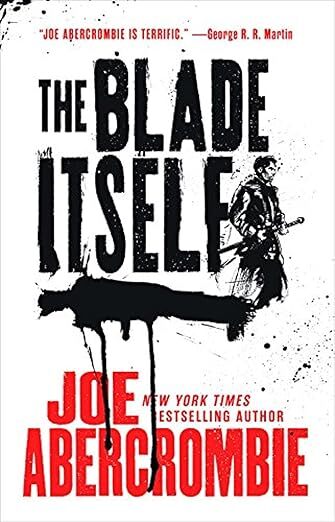
Joe Abercrombie‘s The Blade Itself plunges us into the grim and gritty Union, where Logen Ninefingers, also known as “the Bloody-Nine,” proves that you can indeed lose a finger and gain a title.
This book isn’t strictly about assassins, but it has enough backstabbing and literal stabbing to qualify.
Abercrombie crafts a world where every alliance is a potential death sentence and the only thing cheaper than life is one’s dignity.
get your copy.The Assassin’s Curse by Cassandra Rose Clarke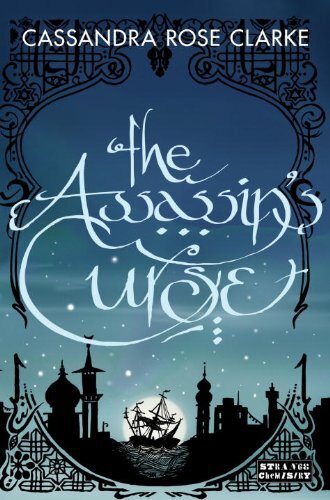
If you ever thought about mixing pirates with assassins and throwing in a magical curse for good measure, The Assassin’s Curse is your kind of tale.
Cassandra Rose Clarke introduces us to Ananna, a pirate princess on the run who inadvertently triggers a curse binding her to an assassin sent to kill her.
This book offers a swashbuckling escape with a duo who could kill each other at any moment but must work together to survive.
It’s like a magical version of couple’s therapy, but with more knives.
get your copy.Red Sister by Mark Lawrence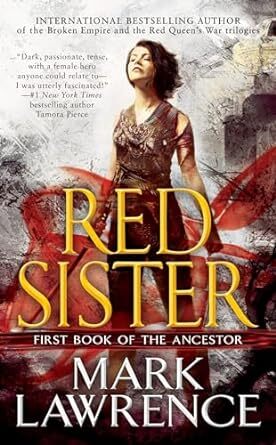
In Red Sister, Mark Lawrence proves that the deadliest assassins might just come from a convent.
Nona Grey’s journey from condemned prisoner to novice in the Convent of Sweet Mercy is littered with enough blood and betrayal to make a stone weep.
This is not your typical school; here, they teach you how to survive first and pray later.
The nuns are more likely to pass you a blade than a bible, making it the perfect school for those who like their education with a side of existential dread.
get your copy.Assassin’s Gambit by Amy Raby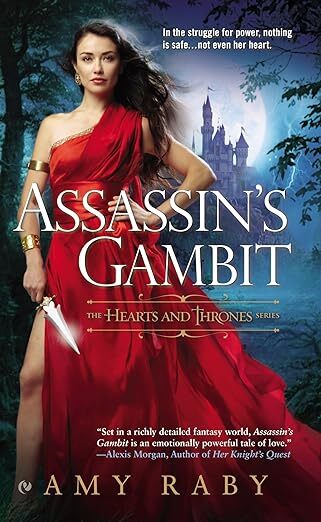
Assassin’s Gambit thrusts us into the heart of an empire where hearts are won with charm but empires are kept with daggers.
Vitala, an assassin and spy, targets the emperor but ends up entangled in a dangerous game of court intrigue and romance.
This novel blends the sharp precision of assassination with the unpredictability of love, proving that the heart can be as effective a target as the back.
get your copy.The Hogfather by Terry Pratchett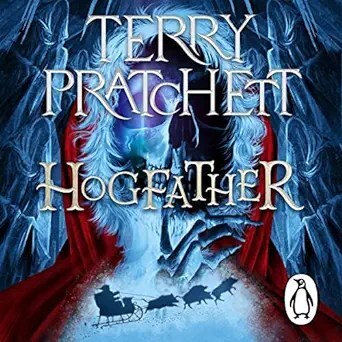
Terry Pratchett’s The Hogfather brings his trademark wit to the fore, weaving a tale where the Discworld faces a crisis of mythical proportions that can only be solved by an assassin.
The Guild of Assassins is tasked with a contract on the Hogfather, Discworld’s version of Santa.
What follows is a hilariously twisted tale that questions the foundations of belief and holiday traditions, all while navigating the perils of professional killing.
get your copy.Darkblade by Andy Peloquin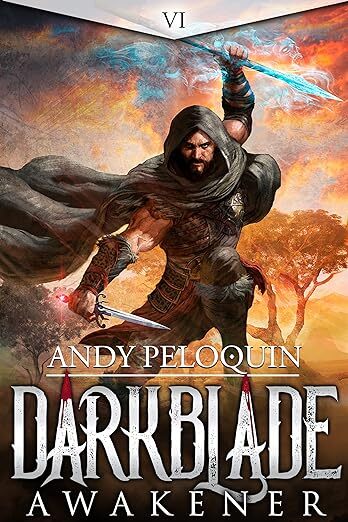
Andy Peloquin’s Darkblade introduces us to the Hunter of Voramis, an assassin with a blade as cursed as his own soul.
Haunted by his past and feared by almost everyone, the Hunter is a master of death who battles not only his external enemies but also his inner demons.
This novel is an exploration of darkness, not just the kind that fills alleyways at night, but the kind that fills a man’s soul.
get your copy.The Left Hand of God by Paul Hoffman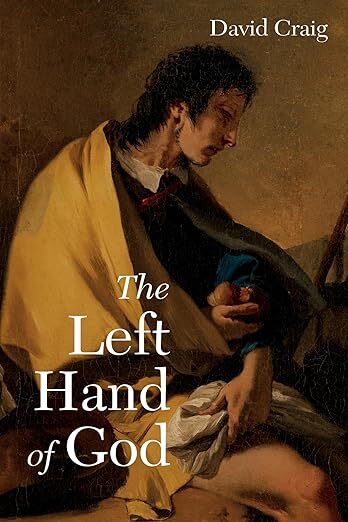
Set in a grim world reminiscent of the European Middle Ages, this novel follows Thomas Cale, who has been raised from childhood to be an assassin in the religious sanctuary known as the Sanctuary of the Redeemers.
Cale’s deadly skills are put to the test as he escapes the oppressive environment and faces a wider world rife with war and chaos.
Get your copy.Grave Mercy by Robin LaFevers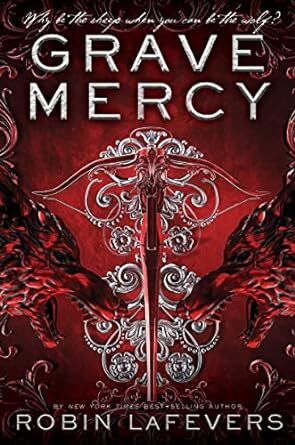
In Grave Mercy, young women serve the god of Death in 15th-century Brittany by training as assassins in the convent of St. Mortain.
Ismae, the protagonist, is one such assassin, using her skills to navigate the complex politics of the high court.
The novel blends historical fantasy with thrilling assassin action, offering a strong female lead and detailed world-building.
get your copy.Shadowdance Series by David Dalglish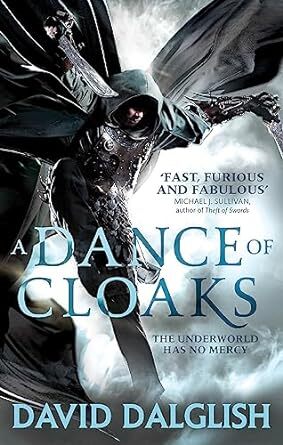
Starting with A Dance of Cloaks, this series features Aaron Felhorn, who is trained from childhood to be the heir to his father’s criminal empire and a master assassin.
The series delves into themes of power, betrayal, and familial bonds, set against a backdrop of a city rife with corruption and violence.
get your copy.The Emperor’s Blades by Brian Staveley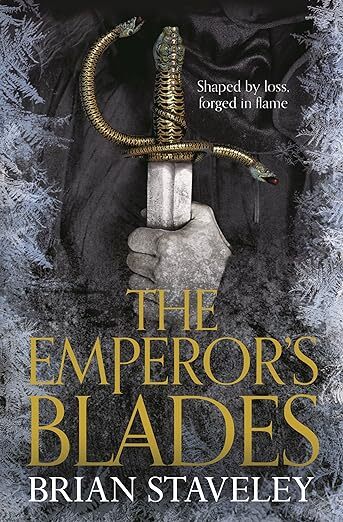
In this opening book of The Chronicle of the Unhewn Throne, the children of the Emperor each follow different paths—one as a monk, another as a soldier, and the third as a minister.
The novel skillfully weaves their stories together with elements of political intrigue, ancient magic, and assassins playing pivotal roles in the unfolding drama of an empire.
get your copy.Assassin’s Apprentice by Robin Hobb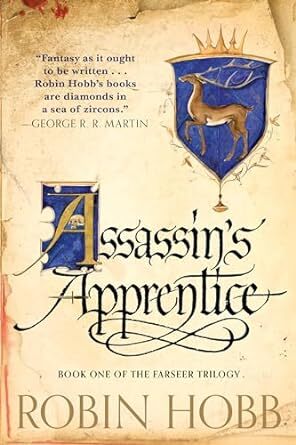
The first book in the Farseer Trilogy, Assassin’s Apprentice introduces readers to Fitz, the bastard son of a prince, who is secretly trained in the ways of a royal assassin.
Through Fitz’s eyes, readers explore a realm where loyalty, political intrigue, and dark magic intertwine, setting the stage for a deeply personal and epic-scale adventure.
Robin Hobb’s detailed world-building and complex character development make this a cornerstone of the genre.
get your copy. The Dark Allure of Assassin FantasyAssassin fantasy provides a darkly mesmerizing escape into worlds where the sharp edge of a blade can alter destinies and where whispered secrets wield the power to topple kingdoms.
Each book in this genre offers a unique blend of intrigue, danger, and moral complexity, drawing readers into the shadows alongside characters who are both compelling and conflicted.
From the gritty streets of Cenaria in Brent Weeks’ The Way of Shadows to the holy halls of the Convent of Sweet Mercy in Mark Lawrence’s Red Sister, these stories explore the nuances of power, loyalty, and survival.
They invite us into the minds and hearts of those who operate on the fringes of society, bound by codes that blur the lines between right and wrong.
For readers looking to dive deeper into the shadowy world of assassin fantasy, Jon Cronshaw’s Guild of Assassins offers a thrilling journey into the life of Soren, an apprentice sculptor turned lethal assassin after the brutal murder of his father.
As Soren navigates the treacherous waters of the assassins’ guild, he is forced to confront not only external enemies but also the internal struggle between his quest for vengeance and his remaining shreds of conscience.
Guild of Assassins is a must-read for anyone fascinated by the complexities of a life pledged to secrecy and the pursuit of justice through unconventional means.
Whether you’re a seasoned aficionado of assassin fantasy or a newcomer to the genre, Cronshaw’s vivid storytelling and rich character development promise an engaging and thought-provoking experience.
So, if your reading list needs a dose of danger and a touch of moral ambiguity, pick up a copy of Guild of Assassins.
Let the adventure begin where the shadows deepen, and discover why assassin fantasy continues to captivate the hearts and minds of readers around the world.
order guild of assassins.The post A Beginner’s Guide to the Thrilling World of Assassin Fantasy first appeared on Jon Cronshaw.



